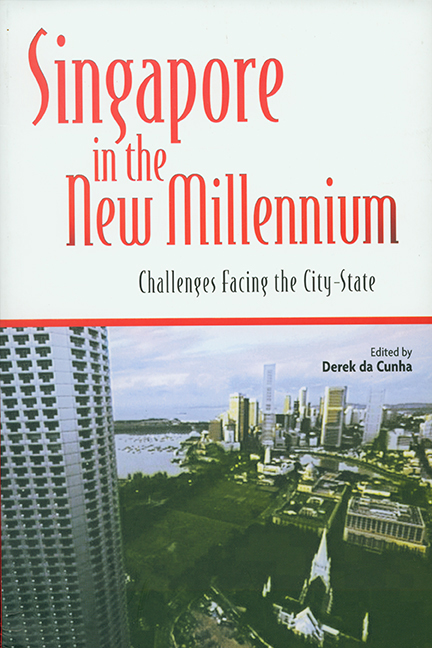Book contents
- Frontmatter
- Contents
- Preface
- Contributors
- 1 The Limits of a City-state: Or Are There?
- 2 External Challenges Facing the Economy
- 3 Governance: Its Complexity and Evolution
- 4 The Future of Civil Society: What Next?
- 5 Relating to the World: Images, Metaphors, and Analogies
- 6 Relating to the World: Images, Metaphors, and Analogies
- 7 Education in the Early 21st Century: Challenges and Dilemmas
- 8 Reframing Modernity: The Challenge of Remaking Singapore
- 9 National Identity, the Arts, and the Global City
- 10 The Media and the Flow of Information
- 11 Conclusion
- Index
3 - Governance: Its Complexity and Evolution
Published online by Cambridge University Press: 21 October 2015
- Frontmatter
- Contents
- Preface
- Contributors
- 1 The Limits of a City-state: Or Are There?
- 2 External Challenges Facing the Economy
- 3 Governance: Its Complexity and Evolution
- 4 The Future of Civil Society: What Next?
- 5 Relating to the World: Images, Metaphors, and Analogies
- 6 Relating to the World: Images, Metaphors, and Analogies
- 7 Education in the Early 21st Century: Challenges and Dilemmas
- 8 Reframing Modernity: The Challenge of Remaking Singapore
- 9 National Identity, the Arts, and the Global City
- 10 The Media and the Flow of Information
- 11 Conclusion
- Index
Summary
Introduction
Governance, or the art of government, traditionally evolved along with contractual or consensual government in Western political thought. Accordingly, together with the democratic belief that state sovereignty is ultimately vested in citizens, governance has conceptually focused on the twin pillars of accountability and responsibility. Accountability is typically a reference to the conduct of public officials and the policies that they implement. Both of these must serve the public good or interest. A narrower focus on fiduciary matters is commonplace in many countries, since public officials are entrusted with public resources in the fashioning and discharge of policies. Responsibility, on the other hand, is typically a reference to public officials undertaking policies to meet, within permissible limits of legality and morality, the demands of the citizenry. Hence, the traditionally articulated twin pillars of governance — centred on responding to public demands in a transparent and acceptable manner.
More recently, the literature on governance has tended in the direction of what has come to be called capacity-building. This newer notion of governance entails elements of a proactive approach while preserving the spirit of accountability and responsibility. Capacity-building, in turn, may be in one of two forms. The first is a structural-functional understanding of the term and is a reference to vertical or horizontal organizational growth to better cater to citizen demands. The second, which is sometimes termed empowerment, is a reference to human resource development — the introduction or facilitation of higher-order skills. Over and above capacity-building, the literature on governance has also encompassed strategic planning, which is essentially a reference to proactive forecast planning to meet public needs in a variety of areas, from the provision of utilities to health and educational opportunities for future generations. In this regard, governance has increasingly gravitated in the direction of pre-emptive planning.
Finally, governance has also increasingly appropriated market principles to achieve a certain efficiency and seamlessness. Whereas this is not a new development since public choice theory has been in existence for almost half a century, the enthusiasm and rapid spread of this approach is only some two decades old.
- Type
- Chapter
- Information
- Singapore in the New MillenniumChallenges Facing the City-State, pp. 50 - 68Publisher: ISEAS–Yusof Ishak InstitutePrint publication year: 2002



